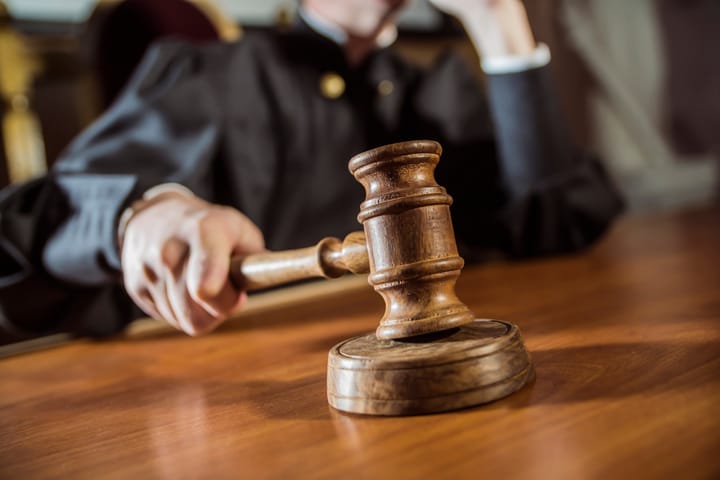Firm culture determines success
Plus: Aviation tax attorney Q&A | Biting in the workplace

What we see is only half the story. Many things that shape the practice of law never show up on a billable hour sheet or a courtroom transcript. In this week’s edition of Raise the Bar, we’re taking a closer look at a few of them. Like the hidden hand (aka AI) that is drafting police reports and deciding which sources get cited in AI summaries at the top of search engine results.
We’re also shining a light on a new study that says firm culture is more important than nearly anything else when it comes to predicting success. And we take a deep dive into the world of business law in bite-sized podcast chunks.
Finally, this week’s Q&A with an airplane tax attorney is a reminder that it’s the invisible parts of owning a plane (sound planning and compliance) that keep private owners aloft. In short, it’s the unseen forces—technological, cultural, and strategic—that are quietly reshaping the legal landscape, and this week, we’re bringing them into view.

"Biglaw biter." A summer associate sank her teeth into 10+ (?!) colleagues before getting canned.
Time for an emergency exit. Swipe over to slide 3 on this Instagram post from @GodLitigation to see this nightmare in the sky.
Law firm 2.0. Former WeWork attorney wants to do to law what TurboTax did to accounting.
Cool off in Big Bay. Whether you’re heading north or staying indoors to beat the heat, you're going to want to visit Big Bay. The small Michigan town is the filming location of the classic legal thriller Anatomy of a Murder, and the site of the real murder that inspired the flick.
Giving back. The State Bar of Texas has a roundup of resources for attorneys who want to provide assistance to victims of the recent floods.

Counsel as co-pilot
Private jets and corporate aircraft conjure images of speed and convenience, but behind the scenes, they’re magnets for red tape and complex legal questions. This week, we’re talking with Letisha D. Sailor, an aviation tax attorney. She and her team at AvTax Advisors guide businesses and high-net-worth clients through the turbulent airspace of tax planning and compliance.
How did you get into such a niche practice? It’s not something I was pitched on in law school!
It had to be destiny at work. I knew I wanted to be an attorney since second grade after falling in love with Perry Mason and Matlock. Then I fell in love with tax at the age of 13 when I prepared my parents’ tax return using the instruction books from the local post office. In law school, I learned that I could do both. I obtained an LL.M. in corporate tax and started my legal career in corporate tax.
I ran into a former classmate at a bar function who was working in aviation law and his work really piqued my interest. Less than a year later, I saw an employment ad for an aviation tax law firm and decided to take the leap. I haven’t looked back and could not see myself working in a non-aviation related practice area.
What’s the most surprising or unusual matter you’ve worked on involving aircraft?
I’m unable to answer this one with detail, but I will say that failed businesses and relationships can lead to interesting legal disputes over aircraft.
Fair enough! How about we get into the weeds on tax law instead? Is it the IRS or the states that give you the most headaches?
It depends. Tax enforcement, audits and other agency compliance measures ebb and flow. There are a lot of variables at play, including understaffed agencies and staff with very little aircraft expertise.
State audits and assessments of aircraft owners are currently on the rise. I am also seeing state taxing agencies taking positions and proposing regulatory changes that could have significant tax consequences for aircraft owners and operators.
I assume you collaborate with others on most of your matters. What’s the secret to doing that well when you are hyper-focused on one issue, but your clients have a lot more than that going on?
The first step is to understand the client’s objectives and delegation of duties amongst the client’s team to meet those objectives. Then it’s all about keeping an open line of communication and managing expectations.
Because we have to strictly follow laws under multiple regulatory frameworks, structuring the ownership and operation of an aircraft is not like any other business asset. We cannot always accomplish tasks in a way the client or another member of the client’s legal team proposes. So, we need them to trust that we know what we are talking about when we flag an issue or suggest something be done differently.

Stop claiming you’re ‘innovative’ if you don’t pay like it
The latest report from the Thomson Reuters Institute, Law Firm Culture: Keys to Unlocking Firm Growth & Lawyer Engagement, makes the case that a firm’s culture has a bigger impact on its success than you might expect. A survey of more than 2,200 stand-out lawyers from 60 countries found that having consistent, well-communicated values are essential for keeping lawyers on the same page, and ensuring that clients understand and trust what a firm stands for.
But the report also exposes a major disconnect: while many firms see themselves as innovative and client-centric, their compensation structures often fail to reward behaviors that align with those aspirations. When compensation fails to match the firm’s cultural messaging, lawyers feel disengaged and are more likely to leave.
Why this matters: This is the old adage about actions speaking louder than words come to life. Firms that want to be successful should make sure their compensation structure reinforces the firm’s stated values and drives success by boosting lawyer engagement, retention and ultimately client satisfaction. (Thomson Reuters Institute)

Policing the truth
Police reports often serve as an important piece of evidence in both civil and criminal cases because they represent an officer’s impressions of what they saw and did at the scene of a crime or accident. But a new report from the Electronic Frontier Foundation (EFF) warns that attorneys may need to reconsider their reliability as law enforcement officials outsource their writing to generative AI.
EFF’s investigation of Axon's Draft One AI tool, which puts together an initial police report from body cam audio, appears intentionally designed to block meaningful oversight: it doesn’t save drafts, track edits or clearly identify which parts were AI-generated. This makes it impossible to check if officers actually reviewed and corrected AI-generated content or what changes were made if they did so.
EFF also warns that AI-written reports could become a dangerous “smokescreen.” Officers might blame the AI for biased language, factual inaccuracies or outright lies, making cross-examination in court far more difficult and undermining the fairness of trials.
Why this matters: The widespread adoption of AI tools is going to fundamentally alter how evidence is created and scrutinized. This is just another example of how the tech is being used and what attorneys need to be on the lookout for. (Ars Technica)

This "bite-sized" podcast has a lot of flavor
Just like law firms, many law schools are launching podcasts to aid their marketing efforts. But few are doing so as well as the Fordham University School of Law. The Bite-Sized Business Law podcast from its Corporate Law Center is genuinely interesting, thanks to the breadth of topics it covers and host/professor/executive director/attorney Amy Martella’s ability to connect the dots.
Listeners get thought-provoking conversations about what's happening in the business world, where the law should go next, what ethical dilemmas are on the horizon, and how today’s big corporate fights ripple through the economy and public policy. It’s not just about what is happening, it’s about why it matters.
Why this matters: From antitrust to AI, M&A to Elon Musk, Bite-Sized Business Law delivers big ideas in digestible chunks. It’s a great way to stay up to speed on what's going on in the business world and begin to think about what might be coming next. (Bite-Sized Business Law)

- How judges describe Trump policies
- Jury to hear Tesla autopilot case
- 75+ former judges speak out against judicial nominee
- Georgia trial court relies on hallucinated cases
- A snapshot of the “shadow docket”

GEO is the new SEO
As AI chatbots like ChatGPT, Claude and Gemini become people’s first stop for information (“zero-click” searches where people get what they need without clicking through are on the rise), traditional SEO (search engine optimization) is no longer getting law firms the web traffic it used to. Marketing professionals are increasingly focusing instead on Generative Engine Optimization (GEO), which focuses on making sure AI models can find, understand and cite your content in their summaries and recommendations.
Why this matters: This article has tips for GEO-optimized writing, but its author, Roman Fedytskyi, also asks some questions about what it means that so many people are willing to let AI decide what information is true or of the most value to them. Who gets cited, whose voices are excluded and how misinformation might spread are issues lawyers in particular must consider as we adjust our marketing materials for GEO. (Medium)

You're all caught up!
Thanks for reading today's edition! You can reach the newsletter team at raisethebar@mynewsletter.co. We enjoy hearing from you.
Interested in advertising? Email us at newslettersales@mvfglobal.com
Was this email forwarded to you? Sign up here to get this newsletter every week.
Raise the Bar is written and curated by Emily Kelchen and edited by Bianca Prieto.




Comments ()